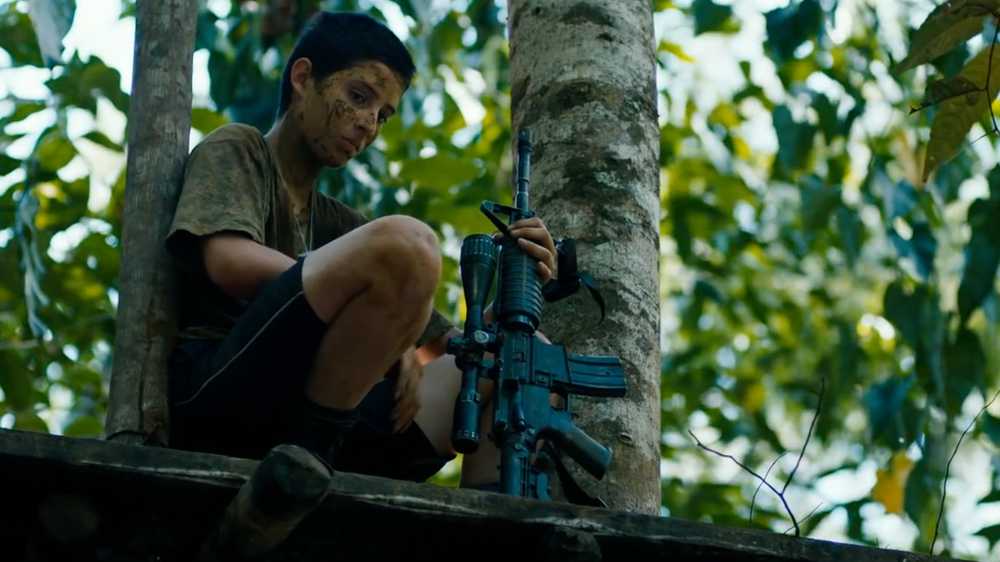From this early tranquility, there can only be dissolution. It soon becomes clear that these are child soldiers doing hostage containment in a remote environment, and while this station might be a tolerable assignment, there can be worse ones. The high-altitude idyll that was their home comes under attack in a sanity-shattering assault of rockets and mortars, and they’re transferred by the Messenger into the jungle, where, like most movies that take place in the jungle, the inhospitable and unforgiving surroundings make peaceful living impossible. Gradually, the playfulness of the early scenes feels like a distant memory, traded in for desperation on Doctora’s part for rescue and cruelty on the part of her jailers, both towards her and on each other. Aided by a score from the incomparable Mica Levi (Under the Skin, Jackie), Landes instills an uncomfortable creep factor as the film transitions to a sweaty, bug-infested battle of wills between Doctora, the Messenger, and the teenagers caught between his orders and the reality of what following them entails.
As a film that heavily centers adolescents, Monos makes manifest something that everyone knows deep in their bones: children shouldn’t have guns. The physical prowess and energy required to be a soldier has never seemed as incompatible with the mental forebearance required to wield deadly power as it does here. The bodies of these teenagers can handle the exertion, but the swagger displayed early as harmless posturing can only degrade into violent domination. Moises Arias, playing a character named Bigfoot, is the avatar of this theme, turning into a wild-eyed sinewy monster as the film goes on. A character like him, reveling in guns and wallowing in military boredom, can only chafe against authority that drops in every few weeks to exert total control over all aspects of his and his friends’ lives, an amped-up encapsulation of the bucking that every teenager engages with.
Monos’ is most successful as an anti-tourist promotion for the jungle, which has rarely looked more uninviting and deadly as it does here. This is a film that smells like a combination of filthy humans, humidity, and rot. A chorus of insect chirps and animal grunts are a constant accompaniment to Levi’s score, making silence or peace an impossibility. Throw on the increasing recklessness of the soldiers, and Monos becomes a pressure cooker with no release valve. So much of this effect is sensory, as Landes uses visceral editing and acting to fully convince the viewer of the environment’s implacable discomfort. Something as necessary as falling asleep becomes something to be dreaded, because that just lays one’s defenses down against the many invaders and parasites who want to make a feast of one’s blood and eye juices. For the teens who ostensibly signed up to be here, there’s a dead-eyed resignation. For Nicholson’s Doctora, there’s the desperation and exertion of an intense physical performance. Landes communicates how badly a person would want to get out of here, and she demonstrates the difficulty of making that a reality.
Monos is a peak cinematic experience about something no one want to experience, and is therefore exactly why the medium is so transporting. Landes prompts the viewer to involuntarily reach up to swat a bug out of their ear, or entices the hairs on the back of one’s neck to stand up at the specific sound the teens make to communicate wordlessly with each other, a sound that Levi integrates into the score to further unnerving effect. The tactile nature of Monos and its descent into jungle madness are a high-water mark for films set in this kind of place, a place where chaotic nature cannot be tamed by any authority other than the will to be nastier and crueler than one’s rival, which is everyone. Herzog would approve. B+

 RSS Feed
RSS Feed